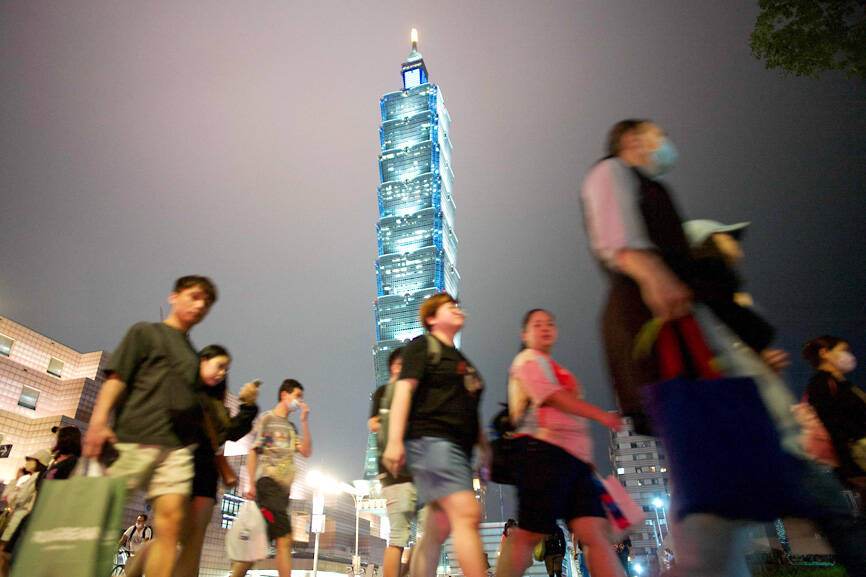Taiwan was the 14th-richest among 193 countries and territories in the world this year, an analysis by Global Finance magazine based on GDP per capita adjusted for purchasing power showed last week.
The world rankings released by the magazine on Thursday last week listed Ireland as the richest country in the world, ahead of Luxembourg in second, with Singapore third, Qatar fourth, Macau fifth, the United Arab Emirates sixth, Switzerland seventh, Norway eighth, the US ninth and San Marino 10th.
Also finishing ahead of Taiwan were Brunei (11th), Hong Kong (12th) and Denmark (13th).

Photo: Sam Yeh, AFP
Among other important economies, Germany ranked 19th, South Korea 30th, the UK 31st, Japan 38th, Russia 60th and China 77th, the report said.
Global Finance said its rankings are based on GDP per capita data from the IMF, which are adjusted to take into account inflation rates, and the cost of local goods and services in each economy.
The resulting figure, known as purchasing power parity, is expressed in international dollars to allow comparisons between different countries, the report said.
Many small countries that hit above their weight economically placed near the top of the rankings, often due to to their sophisticated financial systems, tax programs to attract foreign investment, large stores of hydrocarbons or other natural resources, the report said.
Citing the IMF, the magazine said that some of those figured should be taken with a pinch of salt, as many countries in the rankings, including first-placed Ireland, are tax havens.
This means that the wealth of such countries “was originally generated elsewhere, which artificially inflates their GDP,” and often benefits multinationals far more than the average person, the report said.

SELL-OFF: Investors expect tariff-driven volatility as the local boarse reopens today, while analysts say government support and solid fundamentals would steady sentiment Local investors are bracing for a sharp market downturn today as the nation’s financial markets resume trading following a two-day closure for national holidays before the weekend, with sentiment rattled by US President Donald Trump’s sweeping tariff announcement. Trump’s unveiling of new “reciprocal tariffs” on Wednesday triggered a sell-off in global markets, with the FTSE Taiwan Index Futures — a benchmark for Taiwanese equities traded in Singapore — tumbling 9.2 percent over the past two sessions. Meanwhile, the American depositary receipts (ADRs) of Taiwan Semiconductor Manufacturing Co (TSMC, 台積電), the most heavily weighted stock on the TAIEX, plunged 13.8 percent in

A wave of stop-loss selling and panic selling hit Taiwan's stock market at its opening today, with the weighted index plunging 2,086 points — a drop of more than 9.7 percent — marking the largest intraday point and percentage loss on record. The index bottomed out at 19,212.02, while futures were locked limit-down, with more than 1,000 stocks hitting their daily drop limit. Three heavyweight stocks — Taiwan Semiconductor Manufacturing Co (TSMC, 台積電), Hon Hai Precision Industry Co (Foxconn, 鴻海精密) and MediaTek (聯發科) — hit their limit-down prices as soon as the market opened, falling to NT$848 (US$25.54), NT$138.5 and NT$1,295 respectively. TSMC's

TARIFFS: The global ‘panic atmosphere remains strong,’ and foreign investors have continued to sell their holdings since the start of the year, the Ministry of Finance said The government yesterday authorized the activation of its NT$500 billion (US$15.15 billion) National Stabilization Fund (NSF) to prop up the local stock market after two days of sharp falls in reaction to US President Donald Trump’s new import tariffs. The Ministry of Finance said in a statement after the market close that the steering committee of the fund had been given the go-ahead to intervene in the market to bolster Taiwanese shares in a time of crisis. The fund has been authorized to use its assets “to carry out market stabilization tasks as appropriate to maintain the stability of Taiwan’s

In a small town in Paraguay, a showdown is brewing between traditional producers of yerba mate, a bitter herbal tea popular across South America, and miners of a shinier treasure: gold. A rush for the precious metal is pitting mate growers and indigenous groups against the expanding operations of small-scale miners who, until recently, were their neighbors, not nemeses. “They [the miners] have destroyed everything... The canals, springs, swamps,” said Vidal Britez, president of the Yerba Mate Producers’ Association of the town of Paso Yobai, about 210km east of capital Asuncion. “You can see the pollution from the dead fish.